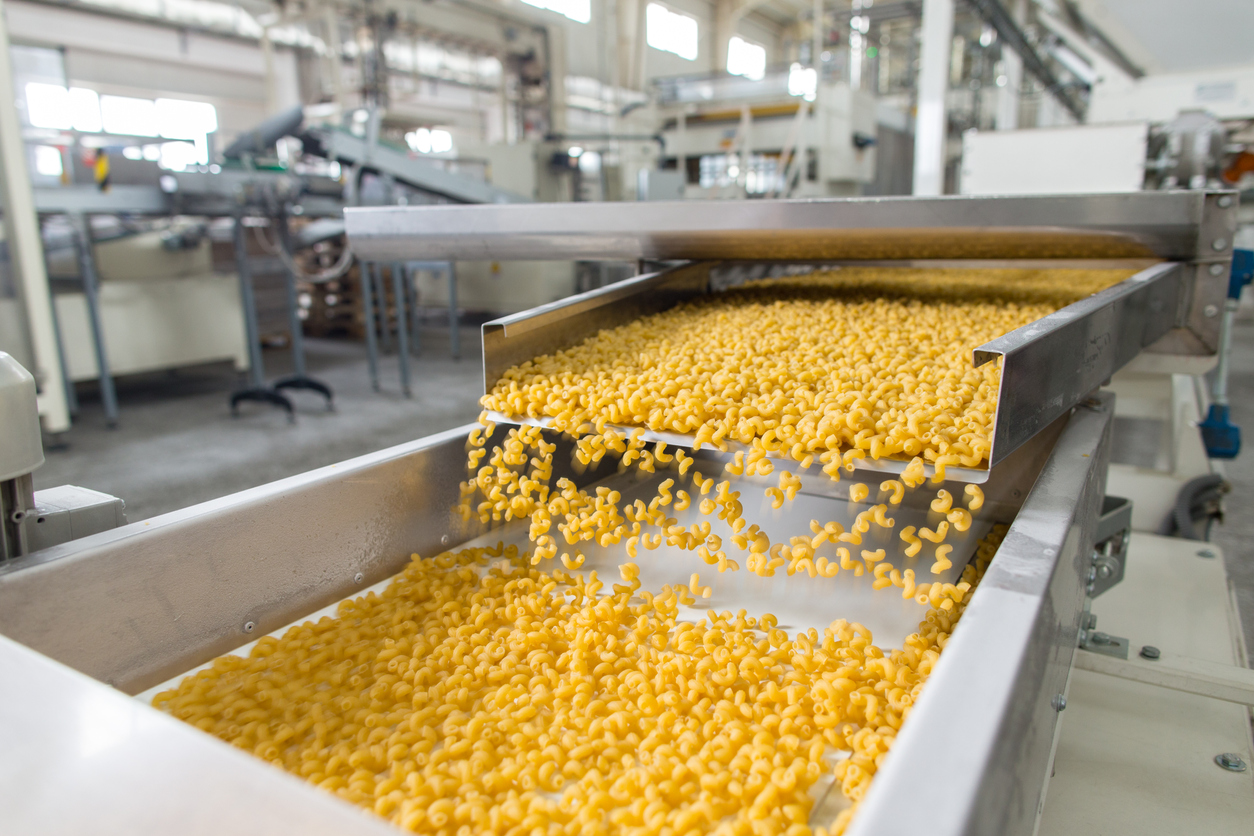From Farm to Table: The Journey of Nigerian Macaroni, Noodles, Couscous, and Similar Products
From Farm to Table: The Journey of Nigerian Macaroni, Noodles, Couscous, and Similar Products
Do you ever wonder where the delicious macaroni, noodles, couscous, and similar products on your plate actually come from? Well, get ready to embark on a fascinating journey as we trace the path of these beloved food items from farm to table. In this blog post, we delve into the world of Nigerian cuisine and explore how these staple foods are cultivated, processed, and transformed into mouthwatering dishes that grace countless dinner tables around the country. Get ready for an eye-opening adventure filled with tales of innovation, tradition, and culinary delights!
Introduction to Nigerian Macaroni, Noodles, Couscous, and Similar Products
Introduction to Nigerian Macaroni, Noodles, Couscous, and Similar Products
Nigeria is a country rich in culture and diversity, and its cuisine is no exception. The traditional dishes of Nigeria are a reflection of its history, with influences from various regions such as Africa, Asia, and Europe. Among the many delicious dishes that Nigeria has to offer, macaroni, noodles, couscous, and similar products hold a special place.
Macaroni is a type of pasta made from durum wheat flour or semolina flour. It is shaped into small tubes and then cooked in boiling water until it becomes soft. In Nigeria, macaroni is usually served with tomato-based sauces or used in casseroles for added texture and flavor.
Noodles are another popular dish in Nigeria that has gained widespread popularity over the years. Originally introduced by Chinese immigrants in the early 20th century, noodles have become an essential part of Nigerian cuisine. They are thin strips of dough made from wheat flour or rice flour that can be boiled or fried and served with various sauces or toppings.
Couscous is a staple food in Northern Africa but has also become increasingly popular in Nigeria. It is made from crushed durum wheat semolina grains and resembles small granules or tiny pearls when cooked. Couscous can be used as a base for stews or salads and often paired with meat or vegetables for a hearty meal.
Similar products to these three dishes include spaghetti (a long thin pasta), vermicelli (a thin spaghetti-like pasta), fusilli (a spiral-shaped pasta), penne (tube-shaped pasta), among others. These products are widely available across markets in Nigeria and have become an integral part of the Nigerian diet.
One might wonder how these products make their way from farm to table in Nigeria? Well, it all starts with the production of wheat which is the main ingredient in these dishes. Wheat is usually grown in the northern region of Nigeria, particularly in states such as Kano, Jigawa, and Sokoto. Farmers harvest the wheat and transport it to mills where it is processed into flour.
The flour is then sent to factories where it is mixed with water and other ingredients to form dough for macaroni, noodles, couscous, and similar products. The dough is then shaped or cut according to the desired shape before being dried or cooked.
After production, these products are packaged and distributed across markets in Nigeria for consumers to purchase. Many households use these products as a quick and convenient meal option that can be easily prepared at home. They are also popular street food options available in many local eateries across the country.
Nigerian macaroni, noodles, couscous, and similar products have become an integral part of Nigerian cuisine with their rich history and cultural influences. From farm to table, these dishes showcase the journey of wheat production and processing in Nigeria. In the following sections of this blog series, we will delve deeper into
History of Farinaceous Products in Nigeria
The history of farinaceous products in Nigeria dates back to the pre-colonial era, when Nigerian tribes such as the Hausa and Fulani were already making various types of grain-based dishes. These dishes were typically made with grains like millet, sorghum, and maize, which were readily available and affordable for most Nigerians.
As trade routes opened up during the colonial period, new ingredients like wheat flour and semolina began to make their way into Nigeria. This led to the introduction of new methods of preparing grain-based foods, including macaroni, noodles, couscous, and other similar products.
Macaroni was introduced to Nigeria by Italian traders in the late 19th century. It quickly gained popularity due to its versatility and ease of preparation. Macaroni became a staple food for many Nigerians and was often served with stews or soups made from local ingredients.
In the 1960s, instant noodles also made their way into Nigeria through trade with Asian countries. These inexpensive and convenient noodles quickly became popular among students and low-income families. Today, instant noodles are a ubiquitous part of Nigerian cuisine and can be found in homes across the country.
Couscous has been a traditional food in North Africa for centuries but only gained popularity in Nigeria during the 20th century. Couscous is made from durum wheat flour that is rolled into small pellets. It is usually served as an accompaniment to stews or as part of traditional dishes like jollof couscous.
With increasing urbanization and changing dietary habits in Nigeria, there has been a rise in demand for convenience foods like macaroni, noodles, couscous, and similar products. This has led to the establishment of large-scale production facilities by both local companies and multinational corporations.
Today, these farinaceous products have become an integral part of Nigerian cuisine. They are not only consumed as standalone meals but are also used in popular dishes like fried noodles, macaroni and cheese, and couscous salad.
In recent years, there has been a trend towards incorporating local ingredients into these farinaceous products. For example, some companies have started producing noodles made from cassava flour instead of wheat flour. This not only adds a unique flavor to the product but also promotes the use of locally sourced ingredients.
The history of farinaceous products in Nigeria continues to evolve as new methods of production and innovative recipes are introduced. These products have become an important part of Nigerian cuisine, providing convenience, versatility, and affordability for consumers across the country.
The Production Process: From Farm to Table
The production process of macaroni, noodles, couscous and similar products is a fascinating journey that begins on the farm and ends on our tables. It involves several stages of careful preparation and processing to create the delicious and versatile food items that we all know and love.
It all starts with the cultivation of wheat, which is the main ingredient in most types of pasta. Wheat plants are grown in large fields where they are nurtured with water, sunlight, and nutrients until they reach maturity. Once harvested, the wheat grains are cleaned to remove any impurities before being sent for milling.
The next step is milling, where the wheat grains are ground into flour. This process involves removing the outer layer of the grain known as bran and separating it from the endosperm, which contains starch and proteins. The remaining endosperm is then ground into fine flour using different types of mills depending on the desired texture.
After milling, water is added to form a dough which is then kneaded or extruded through various shapes such as tubes or ribbons to create different types of pasta. For example, macaroni takes its tubular shape by passing through a machine with small holes while spaghetti is made by extruding dough through long thin slits.
Once shaped, the pasta goes through a drying process where it is left out in controlled conditions to remove moisture. This ensures that it has a longer shelf life without spoiling or getting moldy. Some types may also be freeze-dried at this stage for easier packaging and storage.
For couscous production, unlike traditional hand-rolled methods used in North Africa, modern techniques involve mixing semolina flour with water to form granules that are then steamed until cooked. The cooked couscous is then dried before packaging.
Noodles have a slightly different production method compared to other pasta varieties as they require alkaline agents like sodium carbonate or potassium carbonate during milling to give them their distinctive yellow color and springy texture. They are then cut into various shapes before being steamed, dried, and packaged.
After the completion of the production process, the final products are checked for quality assurance and packaged for distribution to markets and supermarkets all over Nigeria. From there, they make their way to our tables where they can be enjoyed in a variety of dishes such as soups, stir-fries or salads.
The journey from farm to table for Nigerian macaroni, noodles, couscous and similar products involves a series of carefully planned steps that require precision and expertise to produce high-quality food items. So next time you enjoy your favorite pasta dish, remember the intricate journey it took to get onto your plate.
Wigmore Trading: A Leading Manufacturer of Farinaceous Products in Nigeria
Wigmore Trading is a renowned name in the Nigerian food industry and has been at the forefront of producing high-quality farinaceous products in the country for several decades. The company was established with a vision to provide Nigerians with nutritious and delicious farinaceous products that are not only affordable but also meet international standards.
Located in Lagos, Nigeria, Wigmore Trading has state-of-the-art manufacturing facilities that use modern technology and techniques to produce a wide range of farinaceous products such as macaroni, noodles, couscous, and similar products. The company prides itself on its commitment to quality control, ensuring that every product that leaves their facility meets strict standards of hygiene, safety, and taste.
One of the key reasons behind Wigmore Trading’s success is its emphasis on using locally sourced raw materials. The company works closely with Nigerian farmers to procure high-quality wheat flour, which is then used to make their signature farinaceous products. This not only supports local agriculture but also ensures the freshness and superior taste of their products.
At Wigmore Trading, every step of the production process is carefully monitored by trained professionals who have years of experience in creating perfect blends of ingredients for different types of farinaceous products. From mixing and kneading dough to cutting it into various shapes and sizes, each stage is carried out with precision to achieve consistency in taste and texture.
In addition to this commitment towards quality production methods, Wigmore Trading also prioritizes innovation. Their team continuously works on developing new flavors and varieties to cater to evolving consumer preferences. This has resulted in an extensive product portfolio that includes everything from classic macaroni and spaghetti noodles to more unique options like wholewheat pasta and flavored couscous.
Thanks to its dedication towards producing top-notch farinaceous products coupled with excellent customer service, Wigmore Trading has earned a reputation as one of the leading manufacturers in Nigeria. Its commitment towards promoting a healthy lifestyle through affordable and high-quality products has made it a preferred choice for consumers across the country.
Wigmore Trading is more than just a manufacturer of farinaceous products. It is a brand that represents quality, innovation, and dedication towards providing Nigerians with delicious and nutritious food options. Its contribution to the journey of Nigerian macaroni, noodles, couscous, and similar products has been significant and will continue to be so in the future.
Nutritional Benefits of Macaroni, Noodles, Couscous and Similar Products
Macaroni, noodles, couscous, and similar products have become pantry staples in households all around the world. These versatile and easy-to-cook foods have gained popularity due to their convenience, affordability, and delicious taste. However, apart from being a convenient meal option, these products also offer numerous nutritional benefits that make them an excellent addition to any diet.
One of the main nutritional benefits of macaroni, noodles, couscous and similar products is their high carbohydrate content. Carbohydrates are the body’s primary source of energy and play a crucial role in maintaining overall health. These products are made from wheat flour which is a complex carbohydrate that provides sustained energy release throughout the day. This makes them an ideal food choice for athletes or anyone with an active lifestyle.
Moreover, these products contain essential vitamins and minerals such as iron, niacin, riboflavin, thiamine and folate which are important for proper bodily functions. Iron is essential for producing red blood cells and carrying oxygen throughout the body while B-vitamins help convert food into energy. Folate is crucial for pregnant women as it aids in preventing birth defects in newborns.
Furthermore, macaroni, noodles,couscous,and similar products are low in fat and cholesterol-free making them heart-healthy options. Diets high in saturated fats can increase the risk of heart disease whereas consuming complex carbohydrates can improve heart health by reducing cholesterol levels.
In addition to being packed with nutrients, these products also offer dietary fiber which promotes good digestion and helps maintain bowel regularity. Fiber-rich foods aid in weight management by increasing satiety levels without adding excess calories.
Another key benefit of these products is their versatility when it comes to cooking methods. They can be boiled or baked making them suitable for various dishes ranging from soups to casseroles. This allows individuals to incorporate a wide variety of nutritious ingredients like vegetables or lean proteins into their meals to create a well-rounded and balanced diet.
Macaroni, noodles, couscous, and similar products offer a range of nutritional benefits that make them an excellent addition to any meal. They provide sustained energy release, essential vitamins and minerals, heart-healthy options, dietary fiber and versatility in cooking methods. By including these products in your diet, you can ensure that you are getting the necessary nutrients for maintaining overall health and well-being.
Unique Flavors and Varieties Available in Nigeria
Nigeria is known for its rich and diverse culinary culture, with a wide variety of dishes and ingredients that reflect the country’s history, traditions, and regional influences. When it comes to pasta-based products like macaroni, noodles, and couscous, Nigeria is no exception. In fact, the country boasts a unique range of flavors and varieties that are not found anywhere else in the world.
One of the most distinctive aspects of Nigerian macaroni, noodles, couscous, and similar products is the use of local ingredients in their production. Unlike imported or mass-produced options which often use standardized ingredients and processes, Nigerian producers prioritize using locally sourced materials to create authentic and flavorful products.
For instance, instead of regular wheat flour used in traditional pasta-making methods around the world, Nigerian producers often incorporate cassava flour into their recipes. Cassava is a staple crop in Nigeria and provides a unique taste to their pasta products that cannot be replicated elsewhere.
Furthermore, variations such as yam flour noodles or plantain flour macaroni are also popular among consumers looking for new tastes and textures. These alternatives offer a healthier option for those seeking gluten-free or low-carb options while still enjoying familiar dishes.
Another aspect that sets Nigerian pasta-based products apart from others worldwide is the fusion of different cultural influences. Due to its location on the west coast of Africa and centuries-long history as an important trade hub between Europe and other parts of Africa, Nigeria has been exposed to various cultures over time.
This has resulted in a blend of flavors from different cuisines such as Portuguese chili oil-infused macaroni or Chinese-inspired stir-fried noodles incorporating local spices like suya (a spicy peanut mix). These unique flavor combinations have become staples in many Nigerian households today.
Moreover, Nigeria’s vast landscape produces an abundance of fresh produce all year round. This allows for the creation of seasonal variations in pasta dishes based on what fruits and vegetables are in season. From pumpkin-flavored couscous during the fall to mango-infused macaroni in the summer, the possibilities for unique flavors and varieties are endless.
Nigerian macaroni, noodles, couscous, and similar products offer a diverse range of flavors and varieties that reflect the country’s vibrant food culture. With locally sourced ingredients, fusion of cultural influences, and seasonal variations, these dishes truly embody the farm-to-table journey that makes them not only delicious but also authentically Nigerian.
Sustainable Practices in the Production of Farinaceous Products at Wigmore
At Wigmore, sustainability is at the core of our production process for farinaceous products. We understand the importance of responsible and ethical practices in preserving our environment and ensuring the well-being of future generations.
One of the key sustainable practices we have implemented is sourcing our raw materials locally. This not only supports local farmers and reduces our carbon footprint, but also ensures that we have a consistent supply chain and can maintain high-quality standards for our products. By working closely with local farmers, we are able to support their livelihoods while also promoting sustainable farming methods such as crop rotation and organic farming.
Furthermore, we have invested in renewable energy sources to power our production facilities. Our factories are equipped with solar panels, which significantly reduce our reliance on non-renewable energy sources. This has not only reduced our operating costs but also decreased our environmental impact by reducing greenhouse gas emissions.
In addition to sourcing locally and using renewable energy sources, we have also implemented waste reduction measures. Our packaging materials are made from recyclable materials, and we actively promote recycling among our employees and customers. We also strive to minimize food waste by closely monitoring production processes and utilizing excess ingredients in other product lines or donating them to food banks.
At Wigmore, we believe that sustainability goes beyond just environmental conservation; it also involves social responsibility towards our employees and communities. We provide fair wages and safe working conditions for all employees in our factories. We also support various community outreach programs focused on education, health, and empowerment initiatives.
Another aspect of sustainability in farinaceous product production is ensuring traceability throughout the entire supply chain. At Wigmore, we maintain detailed records of all suppliers’ information to ensure transparency in sourcing ingredients ethically produced without exploitation or harm to workers or the environment.
To continuously improve upon these sustainable practices, we regularly conduct audits of our processes to identify areas where further improvements can be made. We also collaborate with industry experts who share our commitment to sustainability and are constantly researching and implementing new technologies and methods that align with our values.
At Wigmore, we are dedicated to producing farinaceous products in a sustainable manner. By sourcing locally, using renewable energy sources, reducing waste, promoting social responsibility, ensuring traceability in our supply chain, and continuously improving upon these practices, we strive to contribute positively towards the preservation of our environment and the well-being of our communities.








Comments are closed.